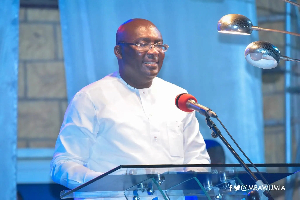As we see the artificial intelligence furore sweep across continents, one thing is clear: Africans have a goldmine at our fingertips. A rapidly growing population of 1.4 billion people, 70% under the age of 30, combined with huge growth in AI investments, creates a potent recipe for Africa. We will not sit back and wait for the rest of the world to reap our rewards.
Africa and the Middle East are set to see the fastest growth in AI spending worldwide, reaching $3bn (£2.4bn) this year and a predicted $6.4bn by 2026.
Africa missed the first, second and third industrial revolutions, but I am determined that our continent will not miss the fourth and fifth.
The piece in the puzzle that will make this a reality is data, driven by highly skilled national tech expertise, and private-sector investments. For every dollar invested in data systems, there is an average return of $32. Data is the lifeblood for making decisions and is what will unlock an independent, wealthy future for Africa, making sure that new economic opportunities are shared.
Since Google opened its first Africa-based AI research centre in Accra in 2019, we have already seen progress in agriculture, healthcare, education and more.
Farmers, in particular, are set to benefit. One project is helping Ghanaian cashew farmers use unmanned aerial vehicles in an AI-powered disease-detection innovation. The flying robots collect data from the leaves, stems and trunks of the cashew trees, allowing farmers to detect pest and disease symptoms before they become visible and lead to serious crop damage.
The initiative, funded by the German development agency GIZ, holds particular value because half of the world’s cashew nuts are grown in Africa.
Another project uses AI to help smallholder farmers in Ghana predict post-harvest shortages and gluts. The technology aims to build better prediction models for crop yields that will give Ghana and the region far greater food security. Given the volatility of managing a smallholder farm, this project – run by the Ghanaian non-profit organisation AGRI-WEB – will help the farmers secure a more stable and sustainable income.
As the 33m smallholder farms in Africa contribute up to 70% of the food supply, the potentially transformative impact of this data-driven technology on livelihoods and food security across the region is vast.
During the pandemic, I saw first-hand how essential data is for us in shaping our decision-making. Through a project with the Global Partnership for Sustainable Development Data, Vodafone Ghana and others, our scientists gathered anonymised mobile phone data from across Ghana’s districts. By looking at how the number of active users changed, we could see how effective lockdowns were in restricting people’s movement. This was vital in telling us when to lift and when to renew measures. Having in-country experts who collect and analyse data holds enormous potential for African decision-makers.
With the growing numbers of young people being trained in data and AI in Ghana, we have a workforce ready to take on the tech revolution and drive progress and economic transformation across the continent. In 2021, Ghana’s Academic City University College in Accra became the first African higher education institution to launch a degree in artificial intelligence.
But we, and the world, cannot sit back and wait. We must stay focused on growing and nurturing this workforce of data experts. As the AI acceleration changes the nature of work, we must prepare a generation of young people to be at the forefront of the revolution, leading Africa into this new era.
This year’s global summits, from New Delhi to New York, provide a historic opportunity for a new way of doing development. In Ghana, we welcomed the Indian government’s commitment to making data for development a priority at this year’s G20 meeting.
But world leaders must show commitment to this agenda at the UN sustainable development goal summit in New York in September, focusing on funding, and building capacity development, skills and partnerships. Data is critical for Africa and the world to achieve the sustainable development goals. And yet decisions are still being made in the dark. For eight of the 17 goals, fewer than half of all countries have data to report.
There is no time to wait. I know that investing in private- and public-sector workforces and building joined-up data systems will unlock the potential opportunities that AI offers. This is what will break down the digital divide between countries and allow Ghana and our African neighbours to be in control of our own success.
It is critical that this revolution is driven by locally led solutions – and brains.
Mahamudu Bawumia is vice-president of Ghana and head of the government’s Economic Management Team.
Opinions of Friday, 2 June 2023
Columnist: theguardian.com



















